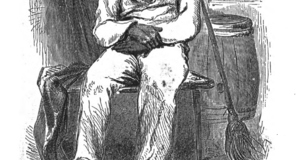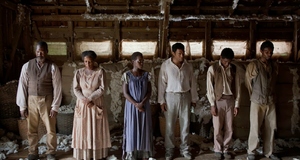Thomas Jefferson's View on Post-Jefferson America
By
2011, Vol. 3 No. 02 | pg. 2/2 | « It is evident from this remark that the Native Americans seem fully open to and capable of assimilation and peaceful coexistence with white people. Jefferson, perhaps naively, believed that Native-American communities could form their own republics, which could one day join into white society. From a Jeffersonian standpoint, it was both virtuous and feasible to try to promote U.S.-Native American relations in the new territories. From a Jacksonian standpoint, however, such peaceful coexistence could not occur. Jackson believed that Indians were not proper individuals but instead savage hunters−as a result, they had to be forcibly removed from US territories. By the 1820s, Jeffersonian ideals of assimilation were coming under attack by slave-owning classes who craved more land for farming. Facing a push by the southern land-owning classes, Jackson pursued the coerced relocation of the Cherokee people. Despite having been ruled unconstitutional by Chief Justice John Marshall in Worcester v. Georgia in 1832, Jackson continued to demand for the relocation of the Cherokee people resulting in what is now known as the Trail of Tears. While Jackson employed the guise of advocating on behalf of the Native Americans against the selfish motives of their chiefs, his true motives were starkly apparent: the driving force for the atrocities he helped to commit was a need for new lands on which to farm more crops.8 Jefferson would be deeply disappointed with the actions of Andrew Jackson. The forced relocation of the Cherokee people embodies the ideals that Jefferson sought to prevent from taking hold in American society, that the Native Americans and white people could not peacefully coexist. Though Jefferson would be pleased by Chief Justice Marshall’s ruling, as it preserved his ideals of assimilation and maintaining the rights of all people, he would highly disapprove of the Trail of Tears, the Seminole War, and all actions taken by Jackson against the Native Americans for the betterment of the slave-holding class.Perhaps the issue causing the majority of the conflict in the early 19th century, slavery dominated the political atmosphere in Jefferson’s time as well as in the 1850s. Prior to the Declaration of Independence Jefferson contemplated slavery in colonial times, considering what made blacks suitable for enslavement, the conflicts created by slavery political and moral, as well as a scientific examination of the African persona. Jefferson comes to the prophetic conclusion in his Notes on the State of Virginia that slavery and the issues it relates to “will divide us into parties, and produce convulsions which will probably never end but in the extermination of the one of the other race.”9 It is apparent from this statement that Jefferson acknowledges the controversy that surrounds slavery; he realizes that the enslavement of other humans, albeit those with lower mental facilities, is not morally correct. Furthermore, he perceives that the political conflicts between the two races can only end in physical conflict−a war. Jefferson’s abolitionist opinions are further exemplified by his version of the Declaration of Independence, in which he criticizes King George for his encouragement of the practice of slavery.10 Although these statements were evidently deemed too polarizing for the final draft, they still betray Jefferson’s true feelings on slavery in the colonies. In 1856, the United States was approaching the brink of physical conflict with regards to slavery. Jefferson would be highly unsurprised by the progress the United States made in this aspect of society−if anything, he would be slightly pleased with the prophetic nature of his words in his Notes on the State of Virginia written some 75 years previously. Northern-Southern political tensions came to their highest point in this era; the Southern-slave owning class wielded considerable political might. During the period from 1776-1850, southerners did not control the presidency for only 13 years, occupied half the seats of the Democratic Party in Congress, and controlled 60% of the Supreme Court. Northerners simply had a majority of free states to slave states beginning only in 1850. It is clear that Southerners did all they could to preserve slavery in the Union. In addition, Southern plantation owners worked tirelessly to prevent insurrection and rebellion from fomenting among the slaves. At each sign of resistance, Southerners passed absurd amounts of legislation designed to completely quell any possible rebellion. For example, when it became apparent to the slave-owning class that abolitionists were disseminating rebellious pamphlets throughout the enslaved classes of the South, the state of Virginia “passed a law banning the written or spoken repudiation of the right to hold slave property.”11 In addition to the legislative conflict regarding slavery, there were also physical conflicts regarding slavery. Nat Turner led a revolt in Southampton County, Virginia in 1831, leading a group of slaves to kill 55 white people in the South before being captured. Despite his execution and subsequent skinning in an attempt to make an example out of him, further rebellions by slaves occurred. On the Ohio River, slaves killed four traders who controlled roughly 75 slaves, taking action against their captors. Five of the slaves were found guilty for murder and sentenced to hanging. Perhaps the most grievous example of abolitionist violence comes from John Brown’s raid on Harper’s Ferry, where he intended to incite a slave rebellion in 1859. Despite each of these events having ended disastrously, multiple violent conflicts arose to combat slavery in the United States. Just as Jefferson predicted, the previous political insurrection was caving and giving way to a violent and physical insurrection that would only culminate in war under the presidency of Abraham Lincoln. Had Jefferson actually simply gone to sleep on July 4th, 1826 for a thirty-year period, he would have mixed views about American society upon waking up. Despite his actions and theories not always lining up, Jefferson had strong views about the role of the executive in government, Manifest Destiny, U.S.-Native American relations, and slavery in the new republic. Helping to exit the rule of one tyrannical despot, Jefferson obviously did not support the consolidation of power by the executive; as such, while he approved of Jackson’s advocacy for the common people, he more than likely had doubts about the spoils system and the power it guaranteed the presidency. Violating his own ideals on the executive branch, Jefferson would be thrilled to find that Americans seized upon his purchase of the Louisiana territory and used it as inspiration to continue expansion westward, but would take issue with the non-diplomatic strategies used to obtain such lands. Diplomatic disasters such as the Annexation of Texas, Mexican-American War, the Treaty of Guadalupe Hidalgo would undoubtedly concerned Jefferson as to the state of U.S.-Mexican relations. Stemming from this notion of Manifest Destiny, Jefferson would be appalled at the state of our relations with the Native Americans in 1856; he would be saddened that Jackson did not listen to Chief Justice Marshall’s advocacy for assimilation and integration of the Native Americans as Jefferson had tried to do during his presidency. Finally, Jefferson would be unsurprised at the atmosphere surrounding slavery in 1856, struggling with the political and moral notions of slavery in his time, he would believe it normal that tensions were rising and starting to build into violent conflicts−he might even be surprised that it had not happened sooner. Upon waking up, it would be clear to Jefferson that the new republic did not take the path that he intended it to when he signed the Declaration of Independence and later assumed the presidency−instead taking a path dictated by his successor’s differing interests and political concerns. References“Transcript: Indian Speech to Jefferson.” In Letters of the Lewis and Clark Expedition with Related Documents 1783-1854, edited by Donald Jackson. Vol. 1. Urbana: university of Illinois Press, 1978, http://www.loc.gov/exhibits/lewisandclark/transcript46.html (accessed 12/16/2010). Camp, Stephanie M.H. Closer to Freedom: Enslaved Women and Everyday Resistance in the Plantation South. Chapel Hill: UNC Press, 2004. Jefferson, Thomas. Notes on the State of Virginia. Literary Classics of the United States., edited by Merrill D. Peterson. New York: Library of America, 1984, http://etext.lib.virginia.edu/toc/modeng/public/JefVirg.html (accessed October 19, 2010). ---. “Rough Draft of the Declaration of Independence.” Ashbrook Center for Public Affairs. http://teachingamericanhistory.org/library/index.asp?document =4 (accessed October 19, 2010). Johnson, Walter. Soul by Soul: Life Inside the Antebellum Slave Market. USA: Harvard UP, 1999. Quinn, Arthur. The Rivals: William Gwin, David Broderick, and the Birth of California. New York: Crown Publishers, 1994 Endnotes
Suggested Reading from Inquiries Journal
Inquiries Journal provides undergraduate and graduate students around the world a platform for the wide dissemination of academic work over a range of core disciplines. Representing the work of students from hundreds of institutions around the globe, Inquiries Journal's large database of academic articles is completely free. Learn more | Blog | Submit Latest in History |














